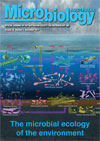
Microbiology Australia
Scope & Guideline
Unlocking the Potential of Microbial Research
Introduction
Aims and Scopes
- Infectious Disease Research:
The journal publishes research on emerging and re-emerging infectious diseases, highlighting their epidemiology, prevention, and management strategies, particularly in the Australian context. - Antimicrobial Resistance (AMR):
A significant focus on AMR is evident, including studies on its implications in healthcare, agriculture, and environmental contexts, promoting a One Health approach to tackle this global issue. - Microbiology Education:
The journal emphasizes microbiology education and training, exploring innovative teaching methods, curriculum development, and the integration of technology in microbiological education. - Environmental Microbiology:
Research on the role of microorganisms in environmental sustainability, including studies on bioremediation, microbial ecology, and the impact of climate change on microbial communities. - Public Health and Policy:
The journal addresses public health issues related to microbiology, including the impact of policy decisions on disease prevention and management, and the role of microbiology in public health strategies. - Zoonotic Diseases:
A focus on zoonotic diseases, including their transmission dynamics and impacts on both human and animal health, reflecting the interconnectedness of human and animal microbiomes.
Trending and Emerging
- Long COVID and Post-Acute Sequelae:
A notable increase in research related to Long COVID highlights the ongoing public health crisis and the need for innovative therapeutic interventions and management strategies. - One Health Approach:
The One Health framework, integrating human, animal, and environmental health, has gained traction, with multiple studies examining antimicrobial resistance and zoonotic diseases through this lens. - Wastewater Surveillance:
Research focusing on wastewater-based epidemiology, particularly for tracking SARS-CoV-2, has emerged as a critical tool for public health monitoring and response. - Microbiome Research:
There is a growing interest in microbiome studies, particularly regarding their implications for health, agriculture, and environmental sustainability, reflecting a holistic understanding of microbial interactions. - Innovations in Microbiology Education:
Emerging trends in educational methodologies, including the use of technology and interdisciplinary approaches, indicate a shift towards enhancing microbiology education and training. - Climate Change Impact on Microbiology:
Research exploring the effects of climate change on microbial communities and their functions is increasingly relevant, emphasizing the role of microbiology in addressing environmental challenges.
Declining or Waning
- Traditional Food Microbiology:
Research focused on conventional food microbiology techniques appears to be waning, as the field shifts towards innovative applications, such as biotechnological advancements and microbiome studies. - Basic Laboratory Techniques:
There is a noticeable decline in publications centered around basic laboratory methodologies, as the focus has increasingly shifted towards advanced technologies and interdisciplinary approaches. - Single-Organism Studies:
Studies concentrating solely on single microbial species are becoming less frequent, with a growing preference for research that examines complex interactions within microbial communities. - Veterinary Microbiology:
While still relevant, topics specifically related to veterinary microbiology are less frequently covered, possibly due to the increasing emphasis on One Health and integrated approaches. - Historical Perspectives on Microbiology:
Articles discussing historical developments in microbiology are less common, as the journal leans more towards current and future challenges in the field.
Similar Journals
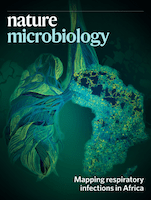
Nature Microbiology
Unveiling the Secrets of Microbial LifeNature Microbiology is a premier journal published by NATURE PORTFOLIO that has firmly established itself within the realms of microbiological research since its inception in 2016. Based in the United Kingdom, this prestigious journal specializes in the intricacies of applied microbiology, cell biology, genetics, immunology, and medical microbiology, making it a cornerstone for academics and professionals alike. With an impressive Scopus ranking placing it in the top tier across various relevant categories—such as rank #3 in Genetics and #2 in Applied Microbiology—it underscores the journal’s commitment to high-quality, impactful research. Although it operates under a subscription model, Nature Microbiology's broad Open Access policy facilitates greater dissemination and visibility for its authors. The journal's objectives are centered around publishing cutting-edge advancements that enhance our understanding of microbial life, its interactions, and applications in health and disease. As a Q1 journal across multiple disciplines, it holds immense significance for researchers, professionals, and students enthusiastic about the latest innovations and breakthroughs in microbiology.

New Microbes and New Infections
Advancing knowledge on the frontlines of infectious diseases.New Microbes and New Infections is an esteemed peer-reviewed journal published by Elsevier Sci Ltd that has been a prominent platform for disseminating groundbreaking research in the fields of Infectious Diseases and Microbiology since its establishment in 2013. With an impressive Open Access model, this journal ensures that vital research findings are readily accessible to researchers, healthcare professionals, and academics worldwide. Positioned in the Q2 category for Infectious Diseases and Q3 for Microbiology in 2023, it reaches a significant global audience, as demonstrated by its high Scopus rankings—#44 out of 344 in Medicine: Infectious Diseases, and #34 out of 182 in Immunology and Microbiology. The journal aims to inspire new ideas and foster collaborations by publishing high-quality research focused on novel microbes and infections, thus playing a crucial role in advancing science and public health in an era where understanding infectious agents is more vital than ever.

Current Clinical Microbiology Reports
Leading the Charge in Microbiological Research and InnovationCurrent Clinical Microbiology Reports, published by Springer, is a leading international journal dedicated to advancing the field of clinical microbiology. With a focus on the diagnosis, treatment, and prevention of infectious diseases, this journal serves as a vital resource for researchers, medical professionals, and students engaged in microbiological studies. As a testament to its quality and influence, it holds an impressive impact factor and ranks in the Q1 category in both Infectious Diseases and Microbiology (medical), reflecting its prominent standing in the scholarly community. Additionally, it features a commendable Scopus ranking, placing it in the 77th percentile for Medicine - Infectious Diseases and the 69th percentile for Medicine - Microbiology (medical). With contributions spanning over a decade, from 2014 to 2024, the journal continues to publish high-quality research articles that shape the future of clinical practices and public health policies. While access options are variable, the journal's commitment to open dialogue and dissemination of knowledge makes it a pivotal platform for those passionate about tackling microbial challenges in healthcare.

AIMS Microbiology
Pioneering discoveries in microbiology and life sciences.AIMS Microbiology, published by the American Institute of Mathematical Sciences (AIMS), is an esteemed Open Access journal dedicated to advancing the field of microbiology since its inception in 2015. With an ISSN of 2471-1888, the journal aims to disseminate high-quality research and innovative findings pertaining to both fundamental and applied microbiology, encompassing areas such as medical microbiology, immunology, and related life sciences. Recognized for its academic rigor, AIMS Microbiology has achieved a significant standing, evidenced by its current Q2 ranking in both Microbiology and Medical Microbiology categories, along with impressive percentile rankings within prestigious Scopus metrics. Based in the United States, the journal not only emphasizes accessibility and widespread dissemination of knowledge but also plays a crucial role in fostering collaboration among researchers and professionals in the microbiological sciences. By providing a platform for collaborative research and innovative ideas, AIMS Microbiology is poised to influence the future development and application of microbiological research, making it a valuable resource for students, researchers, and practitioners alike.

CRITICAL REVIEWS IN MICROBIOLOGY
Driving Progress in Applied MicrobiologyCRITICAL REVIEWS IN MICROBIOLOGY, published by Taylor & Francis Ltd, is a leading peer-reviewed journal that has made significant contributions to the field of microbiology since its inception in 1971. With a prestigious Q1 ranking in Applied Microbiology and Biotechnology, as well as in Medicine and Microbiology, this journal is recognized for its high-quality reviews that synthesize current research and emerging trends in the discipline. Researchers and professionals rely on its comprehensive evaluations and critical insights, helping to advance knowledge and application in various microbiological contexts. Although the journal does not currently operate under an open access model, it remains an invaluable resource for academics seeking to stay at the forefront of microbiological advances. With a consistent publication record, CRITICAL REVIEWS IN MICROBIOLOGY continues to support the scholarly community by addressing key issues and innovations within the field.
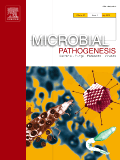
MICROBIAL PATHOGENESIS
Bridging Laboratory Discoveries with Clinical ImpactMICROBIAL PATHOGENESIS, published by Academic Press Ltd - Elsevier Science Ltd, is a prominent journal in the fields of Infectious Diseases and Microbiology, with a notable impact factor and classified in the Q2 quartile for both categories as of 2023. Since its inception in 1986, this journal has provided a platform for the dissemination of cutting-edge research that enhances our understanding of microbial infections and their implications in health and disease. The journal is indexed in Scopus, ranking #80 among 344 in Infectious Diseases and #57 among 182 in Microbiology, underscoring its significant contribution to the scientific community. Although it operates under a traditional subscription model, the content is vital for researchers, professionals, and students focused on the dynamics of microbial pathogenesis and the development of innovative therapeutic strategies. The journal's comprehensive scope aims to foster advancements in this critical area of study, bridging the gap between laboratory research and clinical applications.

Microbiology Research
Fostering Collaboration in Microbial InnovationMicrobiology Research, published by MDPI, stands as a pivotal open-access journal in the field of microbiology, having established its presence since 2010. Based in Switzerland, this journal strives to provide a platform for innovative research and cutting-edge findings in various branches of microbiology, including medical microbiology and molecular biology. With an impact factor that reflects its dedication to scholarly excellence, Microbiology Research is classified in the Q3 category for both microbiology and medical microbiology, and Q4 for molecular biology as of 2023, indicating its growing importance and outreach within these domains. The journal aims to foster discussion and collaboration among researchers, professionals, and students by presenting articles that cover a wide array of topics and methodologies in microbiological research. Leveraging its open-access model, Microbiology Research ensures that high-quality research is accessible to a global audience, thus facilitating the advancement of knowledge and innovation in the microbial sciences.
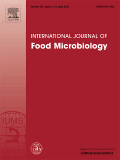
INTERNATIONAL JOURNAL OF FOOD MICROBIOLOGY
Fostering Interdisciplinary Approaches to Food MicrobiologyINTERNATIONAL JOURNAL OF FOOD MICROBIOLOGY is a leading journal in the field of food safety and microbiology, published by Elsevier. With an impressive impact factor and a distinguished position, it ranks in the top quartile for both Food Science and Medicine, as well as holding a strong presence in Microbiology and Safety, Risk, Reliability, and Quality categories. The journal provides a vital platform for researchers, professionals, and students to disseminate and discuss innovative research findings and applications that address the complexities of food microbiology. Operating from its headquarters in the Netherlands, this journal not only facilitates access to high-quality scholarly articles but also encourages the development of interdisciplinary approaches to tackle current challenges in food safety and public health. Since its inception in 1984, the journal has continually evolved, ensuring that it remains at the forefront of scientific inquiry, making it a crucial resource for anyone engaged in the food sciences.
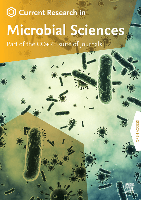
Current Research in Microbial Sciences
Illuminating the Pathways of Infectious Disease ResearchCurrent Research in Microbial Sciences is a distinguished peer-reviewed journal published by Elsevier, focusing on the dynamic and rapidly advancing fields of microbiology and infectious diseases. With an ISSN of 2666-5174, this journal has established itself as an essential resource for researchers, professionals, and students alike, offering the latest findings and insights from 2020 to 2024. The journal holds a significant position in the academic landscape, achieving a Q2 ranking across multiple categories, including Immunology and Microbiology, Infectious Diseases, and Medical Microbiology, demonstrating its impact in these critical areas of study. With impressive Scopus rankings—such as being placed in the 94th percentile for Immunology and Microbiology—current research is well-supported by a thriving scientific community. Although the journal is not open access, it serves as a vital platform for disseminating high-quality research and fostering collaboration within the microbial sciences. Engaging with this journal enables professionals and researchers to stay abreast of innovations and contribute to the collective body of knowledge that shapes our understanding of microbial interactions and infectious diseases.

JOURNAL OF MICROBIOLOGY
Connecting global minds in the realm of microbiology.JOURNAL OF MICROBIOLOGY, published by the Microbiological Society Korea, is a prestigious peer-reviewed journal dedicated to the advancement of knowledge in the fields of microbiology, applied microbiology, and biotechnology. Established in 1996, this journal serves as a vital platform for researchers and professionals from around the globe to disseminate their findings and engage in multidisciplinary discussions pertaining to microbial sciences. With an H-index that reflects its impact, the journal holds a commendable Q2 ranking in key categories including Applied Microbiology and Biotechnology, as well as Medicine (Miscellaneous), which underscores its significance in the academic community. Despite being a subscription-based journal, the JOURNAL OF MICROBIOLOGY aims to contribute to the understanding of microbial processes and their applications, facilitating advancements that are essential in health, industry, and environmental sciences. Researchers, students, and practitioners are encouraged to explore this rich resource for the latest research and trends in microbiology.